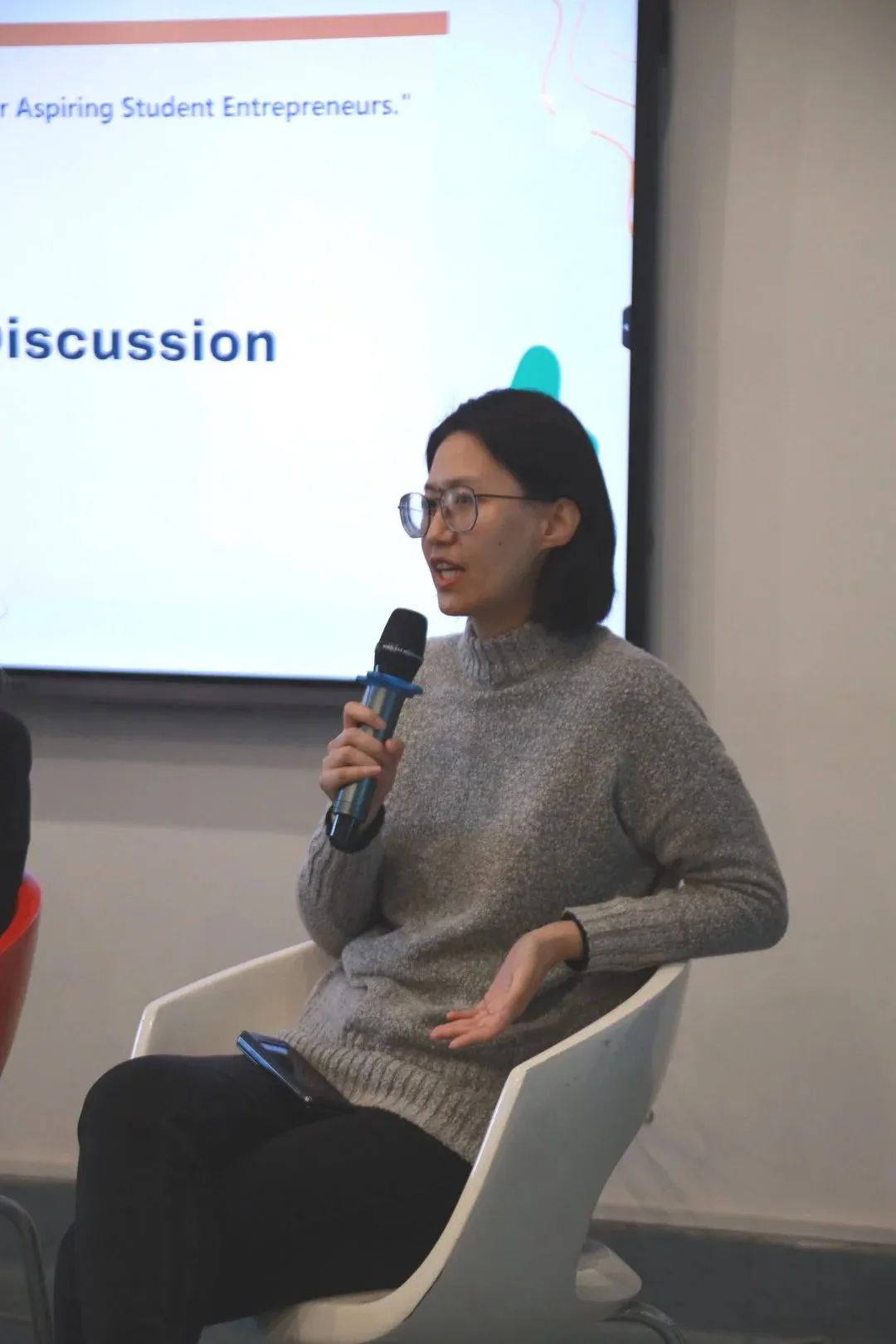On 12/15, ECNU International Students Union (ISU) Employment & Entrepreneurship Department organized an Entrepreneurship Forum titled "Starting a Business in China for Aspiring Student Entrepreneurs".
It is specifically for international students who are interested in building a business in China, and this forum explored various aspects of starting a business for foreigners, such as incubator resources, entrepreneurship policies and unique personal experiences from entrepreneur who had experience starting a business in China.
Marion Campan, Founder and Managing Director at INTANDID

- How to turn our passions into a business?
Turning one's passions into a viable business involves a thoughtful and purposeful approach. I have not translated my passion (diving) into a business—I have preferred a challenging and engaging professional pursuit in Shanghai rather than by the beach.
I have witnessed instances where entrepreneurs are solely driven by financial gains, with no authentic interest in their product or service. This, for me, raises concerns about positive growth and positive challenges in their lives. Given the immense stress associated with building a business, having joy from it becomes a valuable consideration.
- If we have a business idea, how can we test it at the beginning?
In the initial stages of testing a business idea, it is imperative to identify and address fundamental aspects. The first milestone in this process is securing your first client.
No client = No business.
While navigating this delicate phase, it is advisable to consider safeguarding intellectual property if applicable. For entrepreneurs with uncomplicated products or services, engaging in discussions, pitching ideas, and incorporating feedback are crucial steps. The principles outlined in Eric Ries' "The Lean Start-up" provide valuable insights into adopting an agile mindset in entrepreneurship.
- How do you handle failure in starting a business and learn from setbacks?
Managing failure in the entrepreneurial journey requires a proactive approach.
Since failure is an inherent aspect of entrepreneurship, getting used to it is imperative. Embracing failure, especially in small and frequent doses at first, provides valuable insights.
Failing on a smaller scale allows entrepreneurs to adapt, learn, and fortify themselves against more significant setbacks. Cultivating a resilient mindset enables entrepreneurs to navigate challenges with diligence and confidence, drawing on the wealth of experiences gained from overcoming failures.
- Any last tips for students who wish to start a business in China?
For students aspiring to start a business in China, cultivating a supportive and challenging network is essential. Surrounding oneself with like-minded entrepreneurs who can empathize with the challenges of entrepreneurship fosters growth.
Engaging in discussions with peers who comprehend the complexity of your entrepreneurial challenges allows for the exchange of ideas and mutual support. Establishing a "tribe" of entrepreneurs also serves as a valuable resource, offering diverse perspectives and aiding in personal and professional development.
Summer Shen, Co-founder of TIEX (The Innovative Expedition)

- Any suggestions on how to differentiate our products or services in a crowded market?
Start from your familiar industries, select potential markets, find the pain points of your target group, generate effective solutions, and continuously optimize your products and services through customer feedback and industrial trends.
Don't worry about a crowded market, with the advancement of science and technology, as well as the ever-changing needs of society, we will always need new services and products to meet the demands of people's spiritual and material lives.
- What are some incubators you would recommend for students?
Incubator resources are abundant in the market that can meet the different needs of students.
If your business idea is not yet very mature, I would usually suggest you start with the resources around you, such as incubators on campus or incubators around the school. For students of ECNU, the School of Innovation and Entrepreneurship, ECNU Technology Park, ZIZHU ET space etc. are all very good resources around the school.
If student entrepreneurs are very clear about their business model and needs, then they can target the incubators in their fields, and those incubators will address their real needs according to the industry they are in, and the resources they require.
- How should students go about selecting the most suitable incubator for their startup?
Student entrepreneurs could select suitable incubators based on their demands and the resources needed. The resources usually include upstream and downstream industrial resources, financing channels, partners, senior mentors and experts, etc.
Students can learn about the areas in which each incubator specializes through the past activities held by the incubator, the companies in the incubator, their regular mentors, and collaborative organizations, then filter the incubators that are suitable for them by participating in the incubator's activities and interacting with them.
- What personal advice do you have for student entrepreneurs?
Know yourself and figure out what you want.
Start small, validate your idea and optimize your business model before scaling.
If you are clear and confident that you are on the right track, stay passionate and committed to your vision, even when faced with setbacks.
Don't be afraid to fail, failure can be a valuable learning experience, learning the failure of others could also help you detour less.
Continuously seek knowledge and stay updated on industry trends.
Chen Xudong, Chairman of Shanghai Qinglang Cultural Innovation Service Center

- What are the opportunities for foreigners to start a business in China based on the government policies?
It is very necessary to refer to Chinese policies such as the 14th Five Year Plan. These latest policies are very conducive for entrepreneurship, discovering business opportunities, finding businesses, and entrepreneurial projects with commercial value attributes, which are of great help to students.
- What skills and knowledge do you think a foreigner starting a business in China needs to accumulate?
In terms of basic knowledge, some business concepts that entrepreneurs need to understand include business models, market analysis, financial management, marketing, human resources, and so on. We can learn through self-study or participating in school's business courses; In terms of skills, personal advice is not to blindly follow the trend. Combining one's own interests and preferences to determine the direction may lead to better remuneration in a happy job.
- What is the difference between student entrepreneurship and entrepreneurship after graduation? Do students receive more resources and support?
Student entrepreneurship and social entrepreneurship have both advantages and disadvantages, with the main advantages being that the various pressures of entrepreneurship may be reduced. When you are a student, you can focus more on learning knowledge, and not being bounded by family matters etc. You can focus well both in terms of time and energy.
When you are a student, you can meet excellent people who might have the same interests as you. In the early stages of entrepreneurship, we have a great advantage in finding a team, which can be relatively convenient to find suitable partners for us to start a business together;
In terms of cost control, we can use our identity as students to enjoy some resources of the school, such as shared office spaces, activity centers, libraries, etc; In terms of policies, both the school and the government provide significant support for college students to start businesses. We can also gain some experience, bonuses, entrepreneurial partners, etc. by participating in some school competitions, such as China College Students' 'Internet+'Innovation and Entrepreneurship Competition, the Challenge Cup, Huichuang Youth etc.























